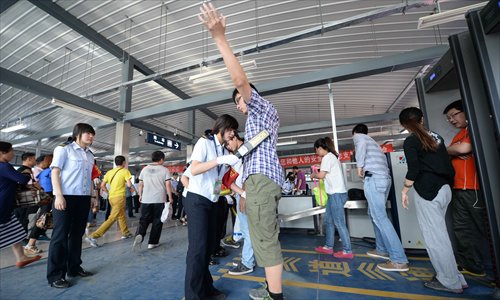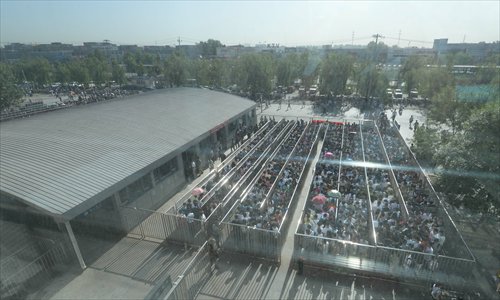Rules of engagement loosened and helicopters patrol skies

A man is checked at a Beijing subway station. Photo: IC

Commuters line up outside a subway station in Beijing during rush hour on Monday morning after the Beijing government started full-body searches in more stations as part of an upgraded anti-terrorism campaign. Photo: IC
Beijing has stepped up its anti-terrorism operations as heavily armed police increased patrols around the city's hot spots, reinforced by helicopters in the air.
The latest instructions from the Ministry of Public Security allows armed police officers from SWAT units in the capital to shoot without identification or warning as long as they are fighting against terrorists. The amount of ammunition police carry has also been doubled, Beijing Evening News reported Monday. Police rarely went armed in Chinese cities until recently.
Since Saturday, five police helicopters have been patrolling routes covering train stations, shopping centers and scenic spots at least twice a day, according to the Xinhua News Agency.
This is part of a year-long nationwide anti-terrorism campaign following a series of terrorist attacks across the country. The latest attack hit Urumqi last week, killing 43.
The area around Beijing's central business district (CBD), including Guomao subway station and the CCTV headquarters, is one of the most heavily guarded spots in the city.
"We pay special attention to areas with the biggest crowds," Xia Hongwei, the head of the police team in charge of the area told the Beijing media.
Two armed police officers from SWAT units were guarding an exit at Guomao station, while at least seven police cars were seen parking near different exits of the station during the Monday evening rush hour.
"Armed patrol vehicles patrol the area everyday around 10 am and 3 pm," a newspaper vendor near the Guomao station told the Global Times on Monday.
The area has seen much more frequent police patrols since the rail station attack in Southwest China's Kunming in March, he said.
These recent measures demonstrate China's greater efforts in combating terrorism following the terror attacks, said Li Wei, director of the Center of Counter-Terrorism at China Institutes of Contemporary International Relations.
Security has been strengthened because the capital city is a tempting target for terrorists, Wang Hongwei, an associate professor of public security at the Renmin University of China, told the Global Times.
Three related attackers, believed to be religious extremists from Xinjiang, drove a car into a crowd in Beijing's Tiananmen Square last October, killing two tourists as well as themselves.
A poll conducted in nine major cities by the Global Times found that about 65 percent of respondents showed their support for police patrolling while carrying guns. The poll also shows 86.5 percent of the more than 1,300 respondents were confident about the government's ability to protect them from terrorism.
Commuters working in the CBD said the increased police force does not affect their daily life. But at the nine subway stations that now requires full-body research, the increased waiting times and growing crowds have drawn concerns that terrorists may see these as attractive targets.
Newspaper headline: Beijing police tighten grip after terror